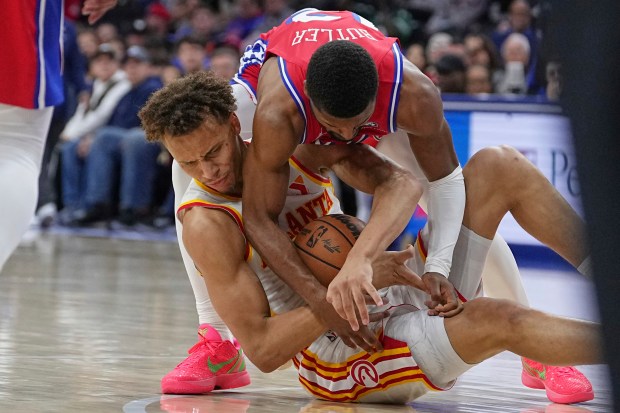It’s finally time for the most controversial stretch of the NBA season — the waiting period between submitting end-of-year ballots and announcing the final award winners.
This year’s voting had a mix of reliably controversial options: Nikola Jokić and Shai Gilgeous-Alexander battling for MVP, and Draymond Green’s last-minute push for Defensive Player of the Year. Other selections, like Clutch Player of the Year, are relatively more straightforward.
This year highlighted the lack of impact from the Chicago Bulls players on the league. The only Bulls player on my ballot was Matas Buzelis, whom I voted for on the All-Rookie Second Team. Buzelis made a strong impression in his debut season, averaging 8.6 points and 3.5 rebounds across 80 games. He was especially notable in his final 31 games of the season, when he averaged 13 points, 4.5 rebounds, 1.9 assists and 1.1 blocks as a starter.
Admittedly, Buzelis was held back from most rookie conversations by his lack of playing time in the first half of the season, but that deliberateness may still pay off for his future success on the Bulls. Still, outside of their rookie, the Bulls were entirely sidelined from the award process.
Despite the dominance of the West, I was surprised by how evenly my ballot was split between the two conferences. This might be a slight reflection of my watching habits while covering the Bulls, but mostly it illustrates how individual excellence buoyed an Eastern Conference with plenty of talent, but little depth below the No. 4 seed.
Here’s how I voted on the main end-of-season awards.
Most Valuable Player: Nikola Jokić
There’s no sugarcoating it — this was a very difficult decision.
Gilgeous-Alexander made this vote easy for no one. He’s one of the most effective and efficient players, leading the NBA in points scored (32.7 per game) and estimated plus-minus (8.6). The Oklahoma City Thunder becomes a buzzsaw with Gilgeous-Alexander helming the offense, a fact that has been painfully evident to the Memphis Grizzlies during the opening round of the playoffs.
But Jokić is averaging a triple-double with 29.6 points, 10.2 assists and 12.7 rebounds per game. He’s performing at an all-time high while playing with one of the weakest supporting casts of his tenure as a superstar on the Denver Nuggets. And when the best player in the world is having the best season of his career — a career-high in points and assists per game while shooting a career-high 41.7% from three — there’s no reason to overcomplicate things.
Defensive Player of the Year: Dyson Daniels
I was not swayed by Draymond Green’s late-season campaign for Defensive Player of the Year. This award had a bit of an open runway after Victor Wembanyama’s midseason injury disqualified him from eligibility, but the Atlanta Hawks’ Dyson Daniels ultimately won me over due to the sheer breadth and depth of his disruptiveness on defense.
Daniels tallied a stunning 229 steals this season. The next closest player — Gilgeous-Alexander — finished with 131. Daniels averaged 3.0 steals while also posting a league-high six deflections per game, completely eclipsing the rest of the NBA in the overall activity of his hands as a defender.
One impressive stat that wasn’t amplified enough during this year’s debate: a player has not averaged this many steals per game since John Stockton, who accomplished the feat 14 years before Daniels was born. Defensive seasons like this one just don’t come around that often, and Daniels should be awarded accordingly.
Most Improved Player: Ivica Zubac
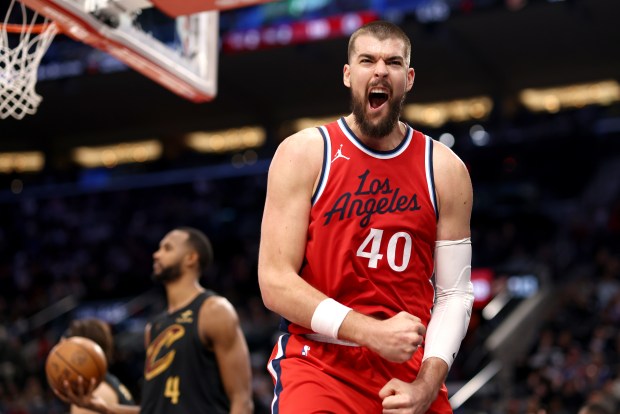
One of the most interesting award topics for debate is the definition of “Most Improved Player.” Improvement is fairly impossible to quantify or compare — in addition to their own progress, players often get better due to a change in their role, a new coach or an improvement in the talent around them.
I landed on Zubac due to his growth after nearly a decade in the NBA. It’s rare for a player to take a leap in the ninth season of his career. After being pushed into the Los Angeles Clippers starting lineup by the departure of Paul George, the 28-year-old averaged 5.1 more points, 3.4 more rebounds and 1.3 more assists.
Even with a higher volume of playing time, Zubac cut down on fouls and maintained his shooting percentage. And over the course of the season, he cemented his role as the final piece in the Clippers’ central trio alongside Kawhi Leonard and James Harden, lifting Los Angeles to the fifth seed in a competitive Western Conference.
Sixth Man of the Year: Payton Pritchard
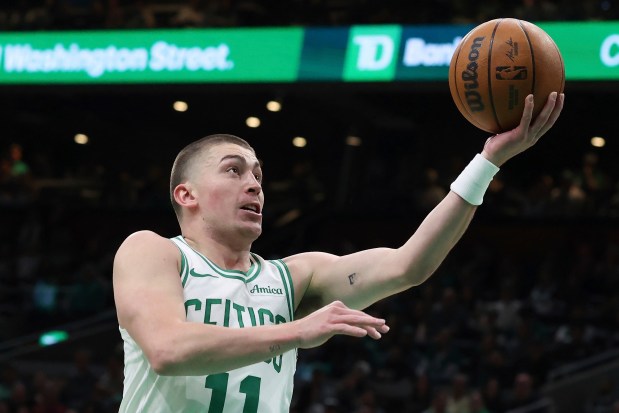
There is something incredibly fun about the unpredictability that Pritchard creates on the Boston Celtics roster. At any given moment, he is liable to rip off a quick handful of threes — the type of flurry that can change a game for the better.
His statistics made a clear argument for Sixth Man of the Year — and he won the award Tuesday. Pritchard is the league leader in bench points, bench 3-pointers (1079) and overall plus-minus rating (428) off the bench. He’s also one of the best facilitators and rebounders for the second-best team in the East. And he started only three times this season even as the Celtics battled injury, a reflection of the stability his role as first off the bench provides.
Rookie of the Year: Stephon Castle
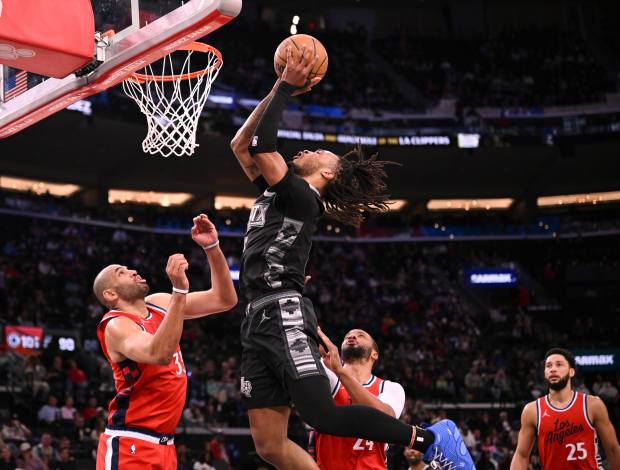
An early season-ending injury to the Philadelphia 76ers’ breakout star Jared McCain upended what otherwise might have been a cut-and-dry race for Rookie of the Year. This was a relatively weak rookie class, which makes for a difficult race given the imperfections of every candidate.
Still, Castle emerged fairly quickly as the outlier. He leads the 2024-25 rookie candidates in points (14.7) after averaging 26.7 minutes across 81 games for the San Antonio Spurs. Castle admittedly needs to shore up his shooting, but in a fairly large role on a fairly young team, he proved to be well-rounded enough as a defender and offensive creator to make an impact.
Clutch Player of the Year: Jalen Brunson
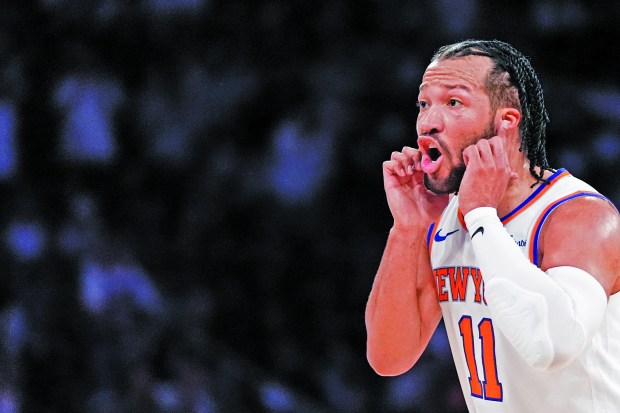
Few players were more automatic in the final five minutes of a close game this season than Brunson. The New York Knicks guard led the league in clutch scoring (5.6 points) while making the most clutch field goals (52) in the NBA.
Brunson shot 51.5% from the floor and a crucial 84% from the line in clutch situations. And he finished second overall in total clutch points (156) — only one point behind Anthony Edwards despite playing in 14 fewer clutch games than the Minnesota Timberwolves star. Brunson won the award on Wednesday.
Coach of the Year: Kenny Atkinson
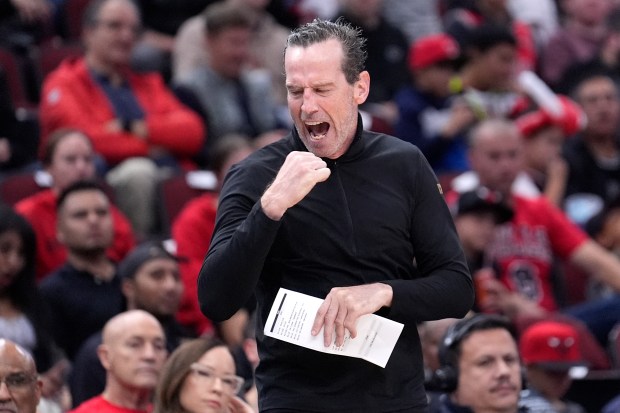
In his first year in Cleveland, Atkinson led the Cavaliers to the top of the Eastern Conference with a 64-win season. Sure, he benefited from a healthy team after last year’s disastrous injuries. Still, Atkinson revitalized the Cavaliers offense. He tweaked Donovan Mitchell’s role and figured out how to get the best out of Evan Mobley. And as a result, Cleveland is now established as a top contender in the East.
This is yet another close race. Like many voters, I had no strong prediction for whether Atkinson would beat out J.B. Bickerstaff, who rallied the Detroit Pistons from a 14-win season to a playoff spot, as both are very deserving.


